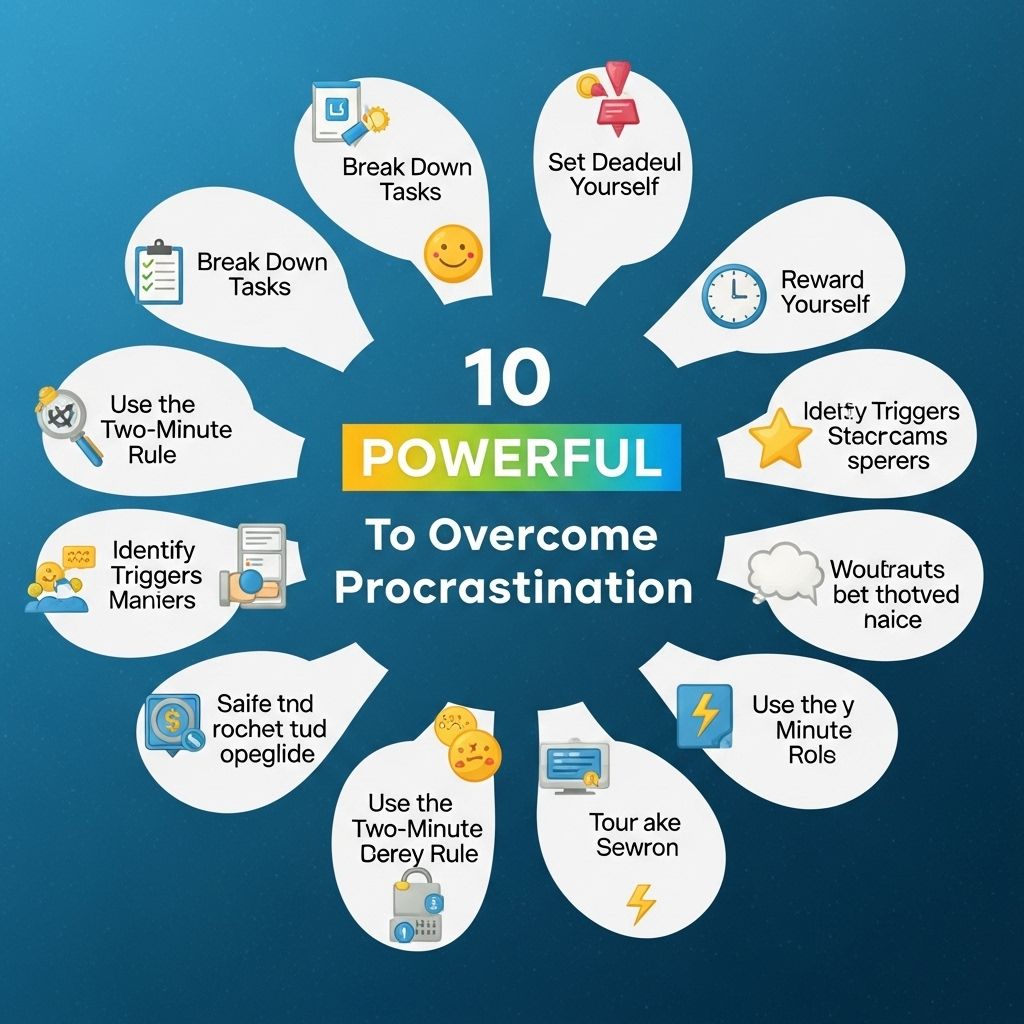Procrastination is a common challenge that affects many people, often leading to missed deadlines, increased stress, and a sense of unfulfilled potential. In a world filled with distractions and competing priorities, overcoming procrastination is essential for productivity and personal growth. Fortunately, there are proven strategies to help individuals take control of their time and achieve their goals. This article delves into ten powerful techniques to combat procrastination and boost your efficiency.
Table of Contents
Understanding Procrastination
Before diving into tips, it’s crucial to understand what procrastination is and why it occurs. Procrastination can be defined as the act of delaying or postponing tasks, often opting for less important activities instead. Common reasons for procrastination include:
- Fear of failure: The anxiety about not meeting expectations can paralyze decision-making.
- Lack of motivation: Without a clear reason or interest in a task, it becomes easy to put it off.
- Perfectionism: The desire to complete a task flawlessly can lead to avoidance.
- Overwhelm: Feeling daunted by the scale of a project can prevent starting it.
1. Set Clear Goals
Establishing specific, measurable, achievable, relevant, and time-bound (SMART) goals can significantly reduce procrastination. This framework helps break down larger tasks into manageable pieces, making them less intimidating.
Example of SMART Goals
| Type | Example |
|---|---|
| Specific | Complete the marketing plan for Q2 |
| Measurable | Increase website traffic by 20% |
| Achievable | Write two blog posts per week |
| Relevant | Align the tasks with overall business objectives |
| Time-Bound | Finish the project by the end of the month |
2. Prioritize Tasks
Utilizing a prioritization strategy, such as the Eisenhower Matrix, can aid in discerning which tasks require immediate attention and which can wait. This method categorizes tasks into four quadrants:
- Urgent and important: Tasks that need immediate action.
- Important but not urgent: Tasks that can be scheduled for later.
- Urgent but not important: Tasks that can be delegated.
- Neither urgent nor important: Tasks that can be eliminated.
3. Break It Down
Large tasks can be overwhelming. To combat this, break them into smaller, actionable steps. For instance, instead of “write a report,” break it down into:
- Research topics related to the report.
- Create an outline.
- Write the introduction.
- Draft each section.
- Edit the final document.
4. Use Time Management Techniques
Implementing time management techniques, such as the Pomodoro Technique, can significantly improve focus and productivity. The Pomodoro Technique involves:
- Setting a timer for 25 minutes, focusing solely on one task during that time.
- Taking a 5-minute break afterward.
- After completing four Pomodoros, take a longer break (15-30 minutes).
5. Eliminate Distractions
Identifying and removing distractions from your environment can help create a conducive workspace. Some tips include:
- Turning off smartphone notifications.
- Using website blockers to limit access to distracting sites.
- Creating a clutter-free workspace.
6. Use Positive Reinforcement
Rewarding yourself for completing tasks can significantly increase motivation. Consider establishing a reward system where you treat yourself after accomplishing specific milestones.
Examples of Rewards
- Enjoying a favorite snack.
- Taking a short walk outside.
- Watching an episode of a favorite show.
7. Develop a Routine
Creating and adhering to a daily routine can help establish a sense of structure and predictability. This can lessen the temptation to procrastinate as it conditions your mind to know what tasks to expect each day.
8. Practice Self-Compassion
Being overly critical of yourself can exacerbate feelings of inadequacy and lead to further procrastination. Practice self-compassion by acknowledging that everyone struggles with procrastination at times and that it’s a natural part of the human experience.
9. Seek Accountability
Sharing your goals and progress with a trusted friend or colleague can create a sense of accountability. Regular check-ins can encourage you to stay on track and provide support when facing challenges.
Accountability Strategies
- Weekly progress meetings.
- Staying in touch through messaging apps.
- Joining an accountability group focused on similar goals.
10. Reflect and Adjust
Periodically reflecting on your progress allows you to assess what strategies are working and what needs adjustment. This can help you stay flexible and responsive to changing circumstances.
In conclusion, overcoming procrastination is an attainable goal with the right strategies in place. By implementing these tips, you can enhance your productivity, reduce stress, and achieve your goals more effectively. Remember that change takes time; be patient with yourself as you work towards improvement.
FAQ
What are effective strategies to overcome procrastination?
Some effective strategies to overcome procrastination include setting clear goals, breaking tasks into smaller manageable steps, using a timer to stay focused, and eliminating distractions.
How can I motivate myself to stop procrastinating?
To motivate yourself, try visualizing the benefits of completing tasks, rewarding yourself for progress, and surrounding yourself with supportive individuals who encourage productivity.
Is procrastination a mental health issue?
Procrastination can sometimes be linked to mental health issues such as anxiety or depression, but it can also be a common behavior related to poor time management and lack of motivation.
What role does time management play in overcoming procrastination?
Effective time management is crucial in overcoming procrastination as it helps prioritize tasks, allocate appropriate time for each task, and create a structured plan to follow.
Can setting deadlines help with procrastination?
Yes, setting deadlines can create a sense of urgency, helping to push past procrastination by providing clear timelines for task completion.
Are there any apps or tools to help with procrastination?
Yes, there are various apps and tools designed to help with procrastination, such as task management apps, focus timers, and productivity trackers that can keep you accountable.







